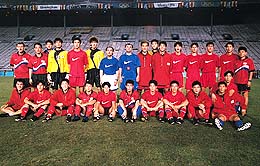
(나이지리아 : 브라질)
(프랑스 : 포르투칼) (멕시코 : 나이지리아) (브라질 : 가 나)
B조 프랑스, 스페인, 호주, 사우디 C조 멕시코, 가나, 한국, 이탈리아 D조 브라질, 나이지리아, 일본, 헝가리 |
| Teams: 16
When: 20 July 1996 to 03 August 1996 Final: 03 August 1996 Matches: 32 Goals Scored: 90 (average 2.8 per match) Attendance: 1,223,769 (average 38242) Winner: Nigeria Runners-Up: Argentina Third: Brazil Fourth: Portugal Top Scorers: BEBETO (BRA) FIFA Fair Play award: Argentina Atlanta, 1996 Nigeria made Olympic football history by becoming the first African and non-European and South American team to win the gold medal. While the football tournament remained primarily an Under-23 competition, each of the 16 competing countries were allowed to use as many as three overage players in a compromise between FIFA and the International Olympic Committee. The Nigerians, whom many observers predicted would be the first African side to win a World Cup, showed so much promise and expectations over the previous decade. They won the 1985 Under-16 World Tournament and finished second in 1987. They took third and second, respectively, at the 1985 and 1989 World Youth Championships. But they could never break the final barrier at the higher levels. Nigeria, coached by Dutchman Johannes Bonfrere, started their path to
the final with a 1-0 victory over Hungary and a 2-0 win over Japan before
completing the first round with a 1-0 loss to Brazil. The Africans then
shut down Mexico and goalkeeper Jorge Campos, 2-0, in the quarter-finals
to set up a pair of amazing matches.
As if trying to top themselves, the Nigerians then staged another miraculous comeback against Argentina in the gold-medal match in front of 86,117 spectators in the Sanford Stadium in Athens, Georgia. The Argentins held a 2-1 advantage on goals by Claudio Lopez (third minute) and Hernan Crespo (tournament-best sixth goal on a penalty kick in the 50th minute) before the Nigerians equalized on Daniel Amokachi's shot in the 74th minute. With a minute remaining, Emmanuel Amunike pulled off some 11th-hour heroics as he took advantage of a botched offside trap and beat goalkeeper Pablo Cavallero from point-blank range for the winning goal in a 3-2 triumph. "I guarantee you that as I talk to you now, everyone in Africa is celebrating," forward Sunday Oliseh said. "There is no sleeping tonight. Everyone will be happy. This is for all the African countries." Besides Nigeria, this competition had a number of surprises. Italy, coached by Cesare Maldini, crashed out of the tournament after a disastrous first round. Those results and disappointing performances eventually cost Maldini his job. Unfancied Japan stunned Brazil in the opening round, 1-0. During a span of several minutes after their 1-1 draw with Mexico, Ghana went through agony and ectasy. They left the field with sullen faces, thinking they had failed to qualify for the quarter-finals. But their faces turned to smiles when Mexican coach Bora Milutinovic told them they had made it. Brazil, who had won four World Cup crowns but never the Olympic gold, were forced to settle for a bronze medal. The South Americans, spurred by Bebeto's three goals, strolled to a 5-0 win over Portugual in the third-place match. Only two years after a successful World Cup, the Olympic Football Tournament
proved to be popular in the USA, as it was during the 1984 Summer Games.
A total attendance of 1,364,142 witnessed the 32 matches, most games paired
as double-headers with the first Women's Olympic Tournament.
|